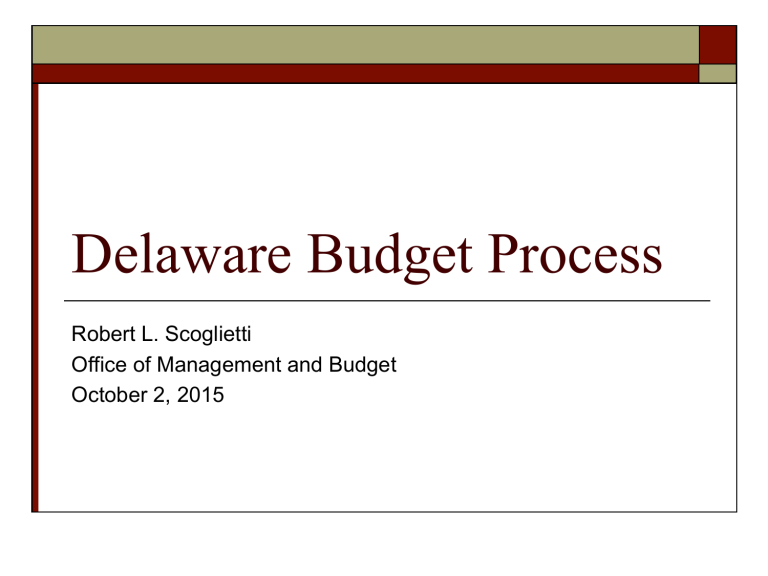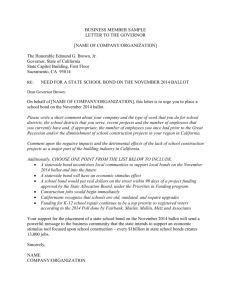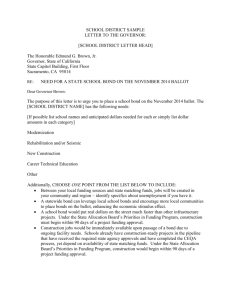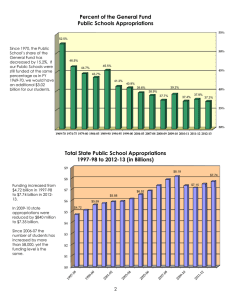Delaware Budget Process Robert L. Scoglietti Office of Management and Budget

Delaware Budget Process
Robert L. Scoglietti
Office of Management and Budget
October 2, 2015
…or demystifying how $ are allocated in
Dover o o
Agenda
Budget Process n n
Revenue
Appropriations
Other issues
Budget Process
Revenue
o o
Delaware’s revenue mix is unique
Relatively low property taxes
No sales tax (no local share) n
State level gross receipts tax o
Corporations’ legal home n
Reliance on related taxes & fees o
Non-tax revenues -- lottery & abandoned property
Delaware Economic & Financial Advisory
Council (DEFAC) o o o
Responsible for preparing & approving expenditure forecast.
THE revenue &
Members appointed by the Governor to serve at their pleasure. o o
Membership of DEFAC broadly represents both the public and private sectors of the State’s economy.
Two Subcommittees: Revenue and Expenditure
Full Council meets 6x/year and ratifies estimates from subcommittees
Types of Funds
General
Funds
Appropriated
Special Funds
Non-
Appropriated
Special Funds
Delaware Fiscal Year 2016
Revenue Forecast
Abandoned Property,
13.6
¢
Business Gross Receipts
Taxes, 5.6 ¢
Bank Franchise
Taxes 2.2
¢
Click to add Text
Personal Income Tax,
32.0
•
•
•
Your text in here
Your text in here
Your text in here
**Incorporation
Revenue, 25.4
¢
•
• ¢
¢
¢
*Other Non-Tax, 4.7
¢
Other Tax Revenue 4.4
¢
• ¢
• Your text in here
• Your text in here
*Includes Prior Year Unencumbered Cash Balance. • Your text in here
**Includes Corporate Franchise Taxes, Business Entity Fees, and Limited Partnerships & Limited Liability Corporations.
Changing Revenue Composition
100%
90%
80%
70%
2.2%
3.1%
4.4%
5.7%
7.5%
5.2%
2.7%
6.2%
5.4%
7.0%
8.1%
6.5%
4.7%
4.7%
5.9%
8.1%
9.2%
4.7%
4.0%
6.1%
8.5%
15.2%
13.6%
2.2%
3.6%
5.6%
15.8% 6.0%
5.0%
18.9%
60%
50%
21.3%
19.3%
23.6%
25.4%
39.4%
40%
36.8%
32.1% 30.7%
30%
26.4% 32.0%
20%
21.9% 10%
17.8% 16.7% 17.9%
15.8%
12.6%
0%
1990 1995 2000 2005
Fiscal Year
2010 2016
Lottery
Abandoned
Property
Bank Tax
CIT
GRT
Franchise *
PIT
Other
* 2000-2016 Franchise figures include LP/LLC collections.
DEFAC Revenues FY 2010 - 2018
4,200
4,000
$4,059
3,800
3,600
$3,730
$3,730
$3,955 $3,951
$3,947
$3,531
3,400
3,200
$3,235
$3,359
3,000
FY 2010 FY 2011 FY 2012 FY 2013 FY 2014 FY 2015 FY 2016 FY 2017 FY 2018
DEFAC
9
Budget Process
Appropriations
Delaware’s Services are
Concentrated at State
o o o
All Adult and Juvenile Social Services n
Public Health, Health, Mental Health, Child
Support, Aging Services, Medicaid, TANF,
Family Services, Unemployment, Vocational
Rehab
All Prosecutorial, Public Defender, and the vast majority of Judicial services
All Detention (Pre-Adjudication), all Jail (2 years or less) and all Prison facilities
Delaware’s Services are
Concentrated at State
o o o o
Approximately 70% of Public Education funding (Operating and Capital)
The majority of Transportation and Public
Transit Services
Largest Police Force in State
50% of Public Library Construction Funding
Legislation
o
Bill
Amend Code o o o o o o o
Appropriate funds
Amend local government charter
Direct someone to do something
Joint Resolution o o
Direct someone to do something
Only in effect during the General Assembly
Resolution o o
Ask someone to do something
Statement or declaration
Constitutional Amendment
Appropriations Legislation
o o
Appropriations: n n n
Operating Budget
Capital Budget (Bond
Bill)
Grants – in – Aid
Epilogue (!)
Delaware’s Appropriations
Legislation o
Operating Budget n
Contains operating funding and position strength authorization for agencies, legislature, judiciary, higher education, education. n n
Funds and positions are appropriated by line item (Personnel Costs, Travel, Contractual
Svcs, Supplies and Materials, Energy, Capital
Outlay, Debt Service) or Program (Medicaid,
International Trade, Assisted Living)
Budget is authored by Joint Finance
Committee, requires simple majority vote
o
Delaware’s Appropriations
Legislation (cont’d)
Capital Improvements Act (Bond Bill) n
Appropriates funds for major/minor capital improvements for state agencies, public schools, Higher Ed institutions n
Also appropriates funds for: o o o o
DelDOT (TTF Capital program)
Economic Development (Strat Fund, Port)
Infrastructure /Land Use (Open Space, Farmland,
Water/Wastewater, Drainage)
Specific Funds to Locals
Delaware’s Appropriations
Legislation (cont’d)
o
Bond Bill (cont’d) n
Authored by Joint Legislative Committee on
Capital Improvements (Bond Bill committee), requires 3/4 approval of Legislature
FY 2016 Operating Budget
Health and Social
Services, 28.6¢
Correction, 7.3¢
Safety and
Homeland
Security, 3.3¢
Public Education,
33.4¢
Other Agencies,
15.1¢
Judicial, 2.4¢
Higher
Education, 5.9¢
Services for
Children, Youth and Their
Families, 4.0¢
18
Delaware’s Appropriations
Legislation (cont’d)
o
Grants - In - Aid Legislation n
Appropriates operating funds to non-profit social service agencies and fire/ambulance companies who provide services for Delaware citizens n n n
Includes the annual subsidy for the county paramedic programs
Authored by the Joint Finance Committee, requires 3/4 vote majority for approval.
May see amendments to operating budget in this bill
Constitutional and Statutory
Spending Limitations
o o o
98% Appropriation Limit n
Cannot exceed an appropriation of 98% of estimated State General Fund revenue for each fiscal year
2% Set-Aside n
Can appropriate between 98%-100% in emergency situations
Rainy Day Fund n
Balance of 5% of Gross General Fund Revenue n
Can only be appropriated by 3/5 vote
Constitutional and Statutory
Spending Limitations
o
Debt Issuance n
Fiscal year general obligation debt issue may not exceed 5% of estimated net General Fund revenue for that fiscal year n
Total fiscal year debt service may not exceed
15% of estimated gross General Fund revenue plus Transportation Trust Fund n
No new debt obligation can be incurred if the maximum annual debt payments exceeds the state’s cumulative cash balances
o
Governor’s Recommended Budget
The Recommended Budget is the Governor’s “Turn at the
Plate” n n n
POLICY/POLITICS -
Opportunity to Show How
Resources Will Be
Allocated to Implement the
Vision Presented in the State of the State
FINANCIAL - Opportunity to Present Financial Plan
STATE OPERATIONS -
Must Provide for General
Operations of the State
Governor’s Budget Development –
Early Fall o o o o o
Validate financial principles
Review Revenues, Sept. DEFAC is key
Identify “Door Openers”
Review Tax policy
Provide framework for policy development
Door Openers
n n n n n n
Debt Service
Employment Costs – Salary, Pension, Health
Medicaid
School Unit Growth
Funding Legislative Initiatives
Federal Mandates o o
MMIS
Federal oversight (DPC, DOC)
Door Openers: Medicaid Eligibles
Medicaid Average Monthly Eligibles
224,198
250,000 217,658
207,067
212,693
193,633
173,771
200,000
150,000
100,000
50,000
-
FY 10 FY 11 FY 12 FY 13
Average Monthly
FY 14 FY 15
25
Door Opener:Enrollment Growth: PK - 12th Grade
137,500
135,000
132,500
130,000
127,500
125,000
122,500
120,000
117,500
115,000
112,500
110,000
107,500
105,000
102,500
100,000
120,491 121,856
123,615
124,903
126,271
127,944
130,102
131,029
132,841
134,442
24
Charter
Schools
05/06 06/07 07/08 08/09 09/10 10/11 11/12 12/13 13/14 14/15
19
School
Districts
District Charter
Excludes DAFB students
School Year
26
Timetable – Governor’s Budget
Development
o o o o o o
August-September (Budget Guidelines/Target)
October (Budget Requests From Agencies)
November (Budget Hearings)
December (Meetings with Governor, DEFAC)
Early January (Budget Director reviews budget with
Cabinet Officials)
Late January (Governor presents budget to Legislature)
o
Timetable – Legislative Budget
Development
February-March (Joint Finance Committee,
Bond Bill Committee holds Public Hearings) o
April-May (Joint Finance Committee Mark-
Up) o o
June (JFC Mark Up continues, Bond Bill and
Grant in Aid)
June 30th (Budget, Bond and Grant-In-Aid
Bill passes the Legislature and Governor signs)
o o o
Major Actors in the Budget Process
Legislative Branch
General Assembly n
Sets appropriations for state government
Joint Finance Committee
(JFC)/Joint Bond Bill
Committee n n
Reviews & marks up
Governor’s budget
Proposes budget for consideration by legislature
Office of the Controller
General n
Counterpart to OMB n
Staffs to JFC & Bond Bill
Committee
Joint Appropriations Committees
o
Structure n
2 committees – JFC, Bond n
Chairs rotate n n
6 House/6 Senate
By politics, 8 D, 4R
JFC Markup
o o o o
“Governor proposes and the Legislature disposes”
Use Governor’s Recommended Budget as blueprint
Use Governor’s Budget as starting point for motions n
Very important to get Gov Budget voted in, takes
7 to vote it out
Usually 10-15 major issues n n n n
Salary
Policy – enacted programs
Operating
Caucus members issues
FY 2015 Recommended
Financial Plan
General Fund Operating Budget $3,908.4 million
Transportation Trust Fund Budget $344.9 million
Grants-in-Aid $43.0 million
Bond and Capital Improvements Act $456.3 million
- State Capital Projects……………………..$247.9 million
- Transportation Projects…………………..$209.3 million
32
Where do I find…..?
Item
Municipal Street Aid/Community
Transportation Funds
Drainage
Location
Bond Bill, DelDOT
Libraries
Volunteer Fire/Ambulance funding
Fund to Combat Violent Crime
SALLE
LEPC
Water/Wastewater
Housing Development Fund
Downtown Development Districts
Tourism
Bond Bill, DNREC “Resource
Conservation and Development”
Operating and Bond bill, Dept of State
Grant in Aid
Operating budget, DSHS
Grant in Aid
Operating budget, DSHS
Bond bill, DNREC
Operating budget, Bond bill, DSHA
Bond bill, DSHA “Urban Redevelopment”
Operating Budget, DEDO (Executive)
Final Thoughts
Long Term Challenges
o o o o
Infrastructure
Revenue n
Abandoned Property n
Lottery
Aging population
What level of services do taxpayers want and are willing to pay for?
Budget Development
–
Other
Thoughts
o o o o o
Budgeting is a process. Those who succeed are experts in not only the policy but the process.
Numbers always have to be correct.
Show enough detail to get policy makers to understand the issue but not too much to lose them.
KNOW your issue but also know how it affects people.
Compromise and negotiation lead to more constructive longer term relationships in Legislative
Hall




